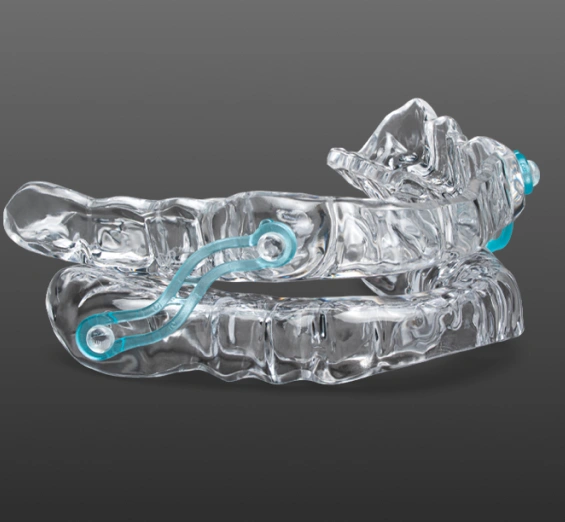
Oral Appliance Therapy for Sleep Apnea
Do you snore at night or feel tired during the day? These could be signs of obstructive sleep apnea (OSA)—a condition that affects your breathing while you sleep and can impact your overall health. OSA occurs when the airway becomes partially or completely blocked during sleep, interrupting airflow and reducing oxygen levels.
Even mild cases can cause loud snoring, morning headaches, fatigue, and poor concentration, while more severe cases may increase the risk of high blood pressure, heart disease, reflux, depression, and stroke.
How Oral Appliance Therapy Works
Custom oral appliances are a comfortable, non-invasive treatment option for snoring and mild to moderate sleep apnea. These devices gently reposition your jaw and tongue forward, helping to keep the airway open throughout the night and improve oxygen flow.
Many patients find oral appliances easier to use than traditional CPAP machines. They are small, portable, quiet, and easy to care for—making them an effective alternative for those seeking a more comfortable sleep solution.
While results may vary, most people experience a significant reduction in snoring and better sleep quality. To ensure optimal effectiveness, follow-up testing and regular checkups are recommended.
Possible Side Effects
- Mild jaw or tooth soreness
- Increased saliva
- Slight bite changes upon waking
These usually resolve quickly after removing the appliance in the morning. Rarely, long-term bite adjustments or dental changes may occur. Your dentist will show you exercises and techniques to minimize these effects and monitor your progress closely.
It’s important to wear your appliance every night to maintain results—discontinuing use without consulting your dentist may increase health risks associated with untreated sleep apnea.
Duration of Treatment and Follow-Up
Oral appliances do not cure sleep apnea but manage it effectively when worn consistently. Regular use helps maintain an open airway and support healthy sleep patterns. Your device should be checked at least twice a year to ensure a proper fit and continued effectiveness.
If symptoms change or you notice a difference in how you feel, schedule a follow-up visit and, if needed, a repeat sleep study.
Other Treatment Options
- Lifestyle changes such as weight management and sleep-position adjustments
- CPAP therapy for moderate to severe apnea
- Surgical options if structural airway issues are present
Take the First Step Toward Restful Sleep
Don’t let snoring or sleep apnea affect your health and quality of life. Schedule your free sleep study consultation today to find out if an oral appliance is right for you.
Call 301-622-1717 to learn more and start your journey toward better sleep, improved focus, and renewed energy.
